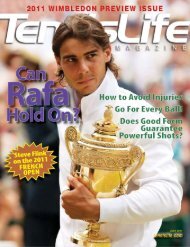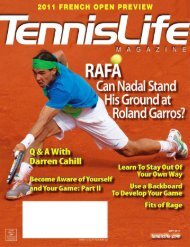A Champion's Mind - Pete Sampras
www.tennismoscow.me Insta:TENNISMOSCOW
www.tennismoscow.me Insta:TENNISMOSCOW
You also want an ePaper? Increase the reach of your titles
YUMPU automatically turns print PDFs into web optimized ePapers that Google loves.
oys play rough.<br />
After the match, I felt really embarrassed and very exposed. You know that feeling when you just want<br />
to cry and you need to talk to a family member? That’s where I was. I needed to hear my mother’s voice,<br />
and when I did, it kind of melted me. I called home and Mom answered. She tends to lapse into a<br />
compassionate drawl when one of us kids needs support, and I clearly remember how sad she sounded as<br />
she said, “Aw, <strong>Pete</strong>y. I saw what happened. Are you okay?”<br />
I just broke down and wept again.<br />
Tim learned the result of the match while he was still en route to Chicago, changing planes in Los<br />
Angeles. He told reporters who met him at LAX, “I didn’t see the match, and I didn’t leave Australia by<br />
choice. If I’m not healthy, I can’t help him. <strong>Pete</strong> deserves a lot of credit for coming back against a great<br />
player like Jim. I’m very proud of him.”<br />
The following day, the match and all the histrionics that went with it were all over the newspapers—<br />
the incident was the talk of Melbourne, and probably New York, Paris, and London. Walking onto the<br />
grounds, and in the locker room, I could feel people looking at me and talking about me, and all the<br />
attention made me intensely uneasy. I told Paul I had never felt so vulnerable in all my life.<br />
If there was ever a tournament that I seemed destined to win, it was that 1995 Australian Open. But it<br />
doesn’t always work that way. I beat Michael Chang in the semifinals, but ended up losing the final to<br />
Andre Agassi despite winning the first set. It was Andre’s second consecutive Grand Slam title (and the<br />
only time in our careers that he beat me in a major final). I was emotionally drained by the day of the<br />
final, but that’s no excuse. I’ve never blamed Andre for ruining the storybook ending, either. You live by<br />
the sword and you die by the sword.<br />
After the tournament, some of the things I heard and read really bothered me. People were writing<br />
things like, “See, <strong>Pete</strong> <strong>Sampras</strong> really is human . . . he shows emotion!” or “It took the illness of his coach<br />
to bring out emotions in <strong>Pete</strong> <strong>Sampras</strong> and make him seem human . . .” I suppose that some of those<br />
comments were meant to be flattering. Some certainly were wrapped in stories that were otherwise<br />
positive descriptions of how I had managed to beat Jim. But I had the uncomfortable feeling that some<br />
commentators really did believe my effort not to show emotion meant I didn’t have emotions, at least not<br />
to a sufficient degree. The inference seemed obvious: in some vague way I was less “human.” Coupled<br />
with the Wimbledon “<strong>Sampras</strong> is boring” theme, this was a heavy one-two punch at my personality and<br />
nature.<br />
I guess it was a sign of the times. Things in tennis and society had changed an awful lot since I was a<br />
little kid. It seemed that people increasingly craved sensation and they were also much more prone to<br />
letting it all hang out—letting their feelings be known, pursuing their goals with abandon, without<br />
apologies, oblivious to any message they were sending or how it reflected on them. This was supposed to<br />
be more “real” than cultivating discipline and behaving with dignity. In tennis, those floodgates had been<br />
flung open by Jimmy Connors and John McEnroe; in their wake, it was all about “personality.” For me,<br />
it’s always been about discipline.<br />
Those who wanted me to show more “emotion,” to be more “human,” seemed to discount that there are<br />
many different personalities out there, and how they conduct themselves, in private or public, has nothing<br />
whatsoever to do with the depth or nature of their emotions—their “feelings.” Actually, I never trusted<br />
people who were always talking about their feelings, or expressing their emotions. I don’t think flying off<br />
the handle, pandering to sentiment, berating others, making crazy, diva-like demands, or telling people<br />
what they want to hear is a sign that you have deeper emotions, stronger feelings, or are more human.<br />
You’re just less able to exert self-control, or are more demanding, or more willing to pander or make a<br />
horse’s ass of yourself.

















